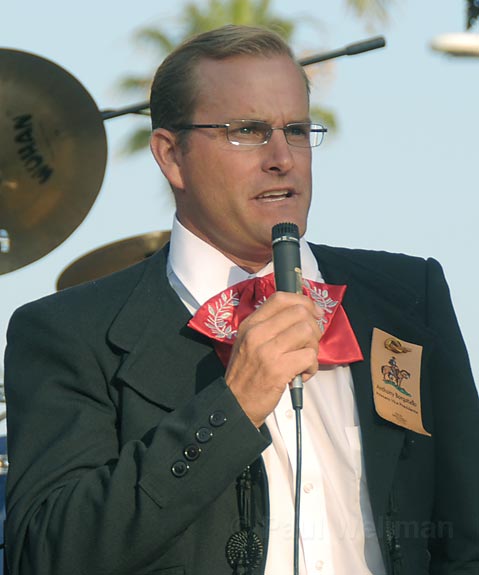
The Fiesta must go on.
That was the main message of Friday morning’s press conference at the Carriage Museum in Santa Barbara, where this year’s El Presidente, Anthony Borgatello, briefed the media, business community, and assorted dignitaries about the state of the city’s annual first-weekend-in-August bash. Also on tap was historian Erin Graffy de Garcia, who ran down the economics of Fiesta, explaining that the event kicks more than $660,000 into the lodging industry and another $25 million to retailers, numbers that throw more than $300,000 back at the City of Santa Barbara in taxes.
No one actually expected that the Old Spanish Days Fiesta would be canceled, but the announcement was deemed significant because other annual events are skipping 2009 due to the poor economy, from the Big Dog Parade to the Black & Blue Ball. “We have a lot of challenges before us, and we know this,” Borgatello said before announcing proudly to brief applause, “I can guarantee you that we are going to have a Fiesta.” But he also warned, “It’s not going to be the Fiesta of last year or the year before.”
Borgatello – a Santa Barbara native and head of MarBorg Industries‘ “liquid waste” (aka port-a-potties) division – explained that it would likely be scaled back a bit, but said that, at the present time, nothing has been cut from the budget that was recently approved by the board. “We don’t want to cut anything completely,” he later explained when asked about specifics. “But cut back? Yes.”
Fiesta’s importance to Santa Barbara’s nonprofit community was cited by Borgatello as one of the main reasons for pushing forward in these tough times. More than 40 other charities rely on Fiesta, said Borgatello, explaining that the annual bash serves as “a platform for other nonprofits to have their largest fundraisers of the year.” But Borgatello, whose company was honored earlier this week by the California Department of Forestry for being a first responder during the recent wildfires, also asked for the public’s support, saying, “This year, we’re going to rely on the community more than ever.”
Borgatello also announced that this year’s theme would be “a tribute to tradition” in an attempt to “bring things back to its core” and thanked Mike Dominguez, his first vice president, a position that requires the most on-the-ground work in the whole Old Spanish Days structure, and usually results in being named El Presidente the next year. (Borgatello was first vice president last year.)
Up next was Erin Graffy de Garcia, whose job was to diffuse the conventional wisdom that Fiesta, which was created in 1924 as a means of attracting tourists to Santa Barbara, is not required for revenue anymore. Heading off that and other common gripes at the pass, Graffy de Garcia said that an economic study had been conducted over the past few years with the help of the Chamber of Commerce, Downtown Organization, and Convention and Visitors Bureau to provide some “concrete figures.”
As far as Fiesta lodging goes, while 30 percent of hotels are 100 percent full during the summer, the other 70 percent are only about 88 percent full. During Fiesta, that number jumps to 99.6 percent occupancy, and the usually sold-out hotels also raise their rates. Punching those numbers into a calculator shows a $660,000 boost in hotel revenues, of which $79,000 goes to the City of Santa Barbara in bed tax.
As for retail, Graffy de Garcia provided a more qualitative assessment at first, explaining that there is a bump not only from tourists but also from locals. “Santa Barbara residents spend differently during the week of Fiesta,” she explained, citing conversation she’d had with grocers who say that people buy a lot more food and drink during that time. “Whether or not they go downtown for Fiesta doesn’t make any difference.” When you take all the numbers they compiled, the result is a staggering $25 million in revenues above and beyond what Santa Barbara shops make in the weeks before and after Fiesta. Of that, about $250,000 goes right back to the city, roughly the increased cost it takes for the police to patrol the party. And, as if on cue to combat the complainers who say Fiesta doesn’t help the mom-and-pops, Graffy de Garcia explained, “It’s the smaller retailers who say they do the best.”
Will Fiesta detractors swallow that information whole? Probably not. But one thing remains certain: Fiesta 2009 will go on as scheduled. And whether this recession gets deeper or the country starts pulling out by late summer, the first weekend in August will be just about the right time to raise spirits citywide in the traditional celebration.
See the 2009 Fiesta press release here.



